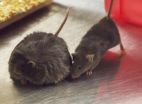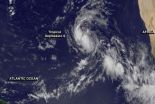(Press-News.org) Washington, DC—Postmenopausal women with diverse gut bacteria exhibit a more favorable ratio of estrogen metabolites, which is associated with reduced risk for breast cancer, compared to women with less microbial variation, according to a new study published in the Endocrine Society's Journal of Clinical Endocrinology & Metabolism (JCEM).
Since the 1970s, it has been known that in addition to supporting digestion, the intestinal bacteria that make up the gut microbiome influence how women's bodies process estrogen, the primary female sex hormone. The colonies of bacteria determine whether estrogen and the fragments left behind after the hormone is processed continue circulating through the body or are expelled through urine and feces. Previous studies have shown that levels of estrogen and estrogen metabolites circulating in the body are associated with risk of developing postmenopausal breast cancer.
"In women who had more diverse communities of gut bacteria, higher levels of estrogen fragments were left after the body metabolized the hormone, compared to women with less diverse intestinal bacteria," said one of the study's authors, James Goedert, MD, of the National Institutes of Health's National Cancer Institute (NCI) in Bethesda, MD. "This pattern suggests that these women may have a lower risk of developing breast cancer."
As part of the cross-sectional study, researchers analyzed fecal and urine samples from 60 postmenopausal women enrolled in Kaiser Permanente Colorado. The women were between the ages of 55 and 69, and all participants had a mammogram with normal results in the previous six to eight weeks. The samples were analyzed for bacterial diversity and the ratio of estrogen fragments to estrogen, a predictor of breast cancer risk.
"Our findings suggest a relationship between the diversity of the bacterial community in the gut, which theoretically can be altered with changes in diet or some medications, and future risk of developing breast cancer," Goedert said. "Findings from this proof-of-principle study need to be replicated in larger groups of women. But we are hopeful that because the microbiome can change the way the body processes estrogens, it may one day offer a target for breast cancer prevention."
INFORMATION:
Other authors of the study include: Barbara J. Fuhrman, Roberto Flores and Mitchell H. Gail of NCI; Heather Spencer Feigelson of Kaiser Permanente Colorado in Denver, CO; Xia Xu of the Frederick National Laboratory for Cancer Research in Frederick, MD; and Jacques Ravel of the University of Maryland in Baltimore, MD.
The study, "Associations of the Fecal Microbiome with Urinary Estrogens and Estrogen Metabolites in Postmenopausal Women," was published online, ahead of print.
Founded in 1916, the Endocrine Society is the world's oldest, largest and most active organization devoted to research on hormones and the clinical practice of endocrinology. Today, the Endocrine Society's membership consists of over 17,000 scientists, physicians, educators, nurses and students in more than 100 countries. Society members represent all basic, applied and clinical interests in endocrinology. The Endocrine Society is based in Washington, DC. To learn more about the Society and the field of endocrinology, visit our site at http://www.endocrine.org. Follow us on Twitter at https://twitter.com/#!/EndoMedia.
Diverse gut bacteria associated with favorable ratio of estrogen metabolites
Suggests lower risk of breast cancer in postmenopausal women
2014-09-11
ELSE PRESS RELEASES FROM THIS DATE:
Puerto Ricans who inject drugs among Latinos at highest risk of contracting HIV
2014-09-11
Higher HIV risk behaviors and prevalence have been reported among Puerto Rican people who inject drugs (PRPWID) since early in the HIV epidemic. Now that HIV prevention and treatment advances have reduced HIV among PWID in the US, researchers from New York University's Center for Drug Use and HIV Research (CDUHR) examined HIV-related data for PRPWID in Puerto Rico (PR) and Northeastern US (NE) to assess whether disparities among PRPWID continue.
The study, "Addressing the HIV/AIDS epidemic among Puerto Rican people who inject drugs: the Need for a Multi-Region Approach," ...
Chemical signals in the brain help guide risky decisions
2014-09-11
A gambler's decision to stay or fold in a game of cards could be influenced by a chemical in the brain, suggests new research from the University of British Columbia.
The rise and fall of dopamine plays a key role in decisions involving risk and reward, from a baseball player trying to steal a base to an investor buying or selling a stock. Previous studies have shown that dopamine signals increase when risky choices pay off.
"Our brains are constantly updating how we calculate risk and reward based on previous experiences, keeping an internal score of wins and losses," ...
Mice and men share a diabetes gene
2014-09-11
A joint work by EPFL, ETH Zürich and the CHUV has identified a pathological process that takes place in both mice and humans towards one of the most common diseases that people face in the industrialized world: type 2 diabetes.
This work was conducted in Johan Auwerx's (EPFL) and Ruedi Aebersold's (ETH Zürich) laboratories, and succeeded thanks to the combination of each team's strengths. The relevance of their discovery, published today in Cell Metabolism, results from their joint effort.
In Lausanne, the researchers carried out a detailed study of the genome and ...
Compound protects brain cells after traumatic brain injury
2014-09-11
A new class of compounds has now been shown to protect brain cells from the type of damage caused by blast-mediated traumatic brain injury (TBI). Mice that were treated with these compounds 24-36 hours after experiencing TBI from a blast injury were protected from the harmful effects of TBI, including problems with learning, memory, and movement.
Traumatic brain injury caused by blast injury has emerged as a common health problem among U.S. servicemen and women, with an estimated 10 to 20 percent of the more than 2 million U.S. soldiers deployed in Iraq or Afghanistan ...
Proactive monitoring of inflammatory bowel disease therapy could prolong effectiveness
2014-09-11
BOSTON – Proactive monitoring and dose adjustment of infliximab, a medication commonly used to treat inflammatory bowel disease (IBD), could improve a patient's chances of having a long-term successful response to therapy, a pilot observational study at Beth Israel Deaconess Medical Center concludes.
The study, published in the Inflammatory Bowel Diseases, evaluated the levels of infliximab, an antibody designed to bind to and block the effects of TNF-alpha, an inflammatory protein found in high levels in patients with IBD, such as Crohn's disease and ulcerative colitis, ...
LSU scientists lead research on speciation in the tropics
2014-09-11
BATON ROUGE – In a study that sheds light on the origin of bird species in the biologically rich rainforests of South America, LSU Museum of Natural Science Director and Roy Paul Daniels Professor in the Department of Biological Sciences, Robb Brumfield, and an international team of researchers funded by the National Science Foundation, or NSF, published a paper this week challenging the view that speciation – the process by which new species are formed – is directly linked to geological and climatic changes to the landscape.
The researchers, whose findings were published ...
Microscopic diamonds suggest cosmic impact responsible for major period of climate change
2014-09-11
Around 12,800 years ago, a sudden, catastrophic event plunged much of the Earth into a period of cold climatic conditions and drought. This drastic climate change—the Younger Dryas—coincided with the extinction of Pleistocene megafauna, such as the saber-tooth cats and the mastodon, and resulted in major declines in prehistoric human populations, including the termination of the Clovis culture.
With limited evidence, several rival theories have been proposed about the event that sparked this period, such as a collapse of the North American ice sheets, a major volcanic ...
Facebook posts reveal personality traits, but recent changes could make it harder to do so
2014-09-11
LAWRENCE — A study from the University of Kansas finds that people can accurately detect the personality traits of strangers through Facebook activity; however, changes to the social media site in the past three years could be making it harder to do so.
Researchers sampled 100 Facebook users, paralleling the demographics of the social networking site, and asked them to fill out a personality survey. A group of coders looked at each person's Facebook activity, 53 cues in all, to see whether certain personality types were more likely to do specific activities. The researchers ...
Sometimes, adolescents just can't resist
2014-09-11
Don't get mad the next time you catch your teenager texting when he promised to be studying.
He simply may not be able to resist.
A University of Iowa study found teenagers are far more sensitive than adults to the immediate effect or reward of their behaviors. The findings may help explain, for example, why the initial rush of texting may be more enticing for adolescents than the long-term payoff of studying.
"The rewards have a strong, perceptional draw and are more enticing to the teenager," says Jatin Vaidya, a professor of psychiatry at the UI and corresponding ...
Satellite view of newborn Atlantic Tropical Depression 6
2014-09-11
The sixth tropical depression of the Atlantic Ocean Hurricane Season formed in the Eastern Atlantic Ocean and NOAA's GOES-East satellite captured it.
A visible image of Tropical Depression 6 was taken by NOAA's GOES-East satellite at 7:45 a.m. EDT on September 11 as it developed. The image was created by NASA/NOAA's GOES Project at the NASA Goddard Space Flight Center in Greenbelt, Maryland.
In addition to using GOES imagery and data from other NOAA and NASA satellites, The National Hurricane Center also uses measurements from the Advanced Scatterometer or ASCAT instrument ...
LAST 30 PRESS RELEASES:
Study finds more parents saying ‘No’ to vitamin K, putting babies’ brains at risk
Scientists develop new gut health measure that tracks disease
Rice gene discovery could cut fertiliser use while protecting yields
Jumping ‘DNA parasites’ linked to early stages of tumour formation
Ultra-sensitive CAR T cells provide potential strategy to treat solid tumors
Early Neanderthal-Human interbreeding was strongly sex biased
North American bird declines are widespread and accelerating in agricultural hotspots
Researchers recommend strategies for improved genetic privacy legislation
How birds achieve sweet success
More sensitive cell therapy may be a HIT against solid cancers
Scientists map how aging reshapes cells across the entire mammalian body
Hotspots of accelerated bird decline linked to agricultural activity
How ancient attraction shaped the human genome
NJIT faculty named Senior Members of the National Academy of Inventors
App aids substance use recovery in vulnerable populations
College students nationwide received lifesaving education on sudden cardiac death
Oak Ridge National Laboratory launches the Next-Generation Data Centers Institute
Improved short-term sea level change predictions with better AI training
UAlbany researchers develop new laser technique to test mRNA-based therapeutics
New water-treatment system removes nitrogen, phosphorus from farm tile drainage
Major Canadian study finds strong link between cannabis, anxiety and depression
New discovery of younger Ediacaran biota
Lymphovenous bypass: Potential surgical treatment for Alzheimer's disease?
When safety starts with a text message
CSIC develops an antibody that protects immune system cells in vitro from a dangerous hospital-acquired bacterium
New study challenges assumptions behind Africa’s Green Revolution efforts and calls for farmer-centered development models
Immune cells link lactation to long-lasting health
Evolution: Ancient mosquitoes developed a taste for early hominins
Pickleball players’ reported use of protective eyewear
Changes in organ donation after circulatory death in the US
[Press-News.org] Diverse gut bacteria associated with favorable ratio of estrogen metabolitesSuggests lower risk of breast cancer in postmenopausal women




